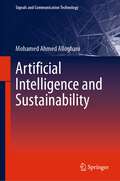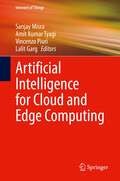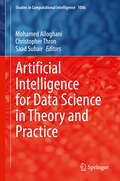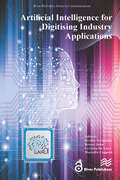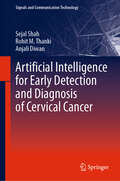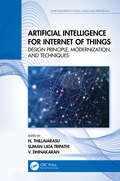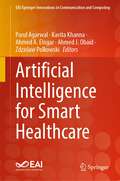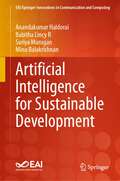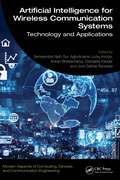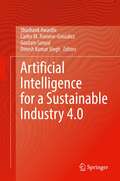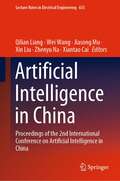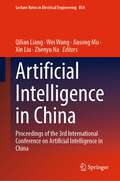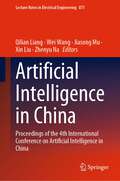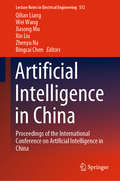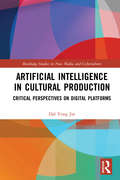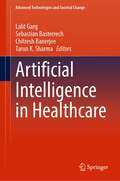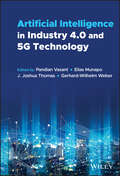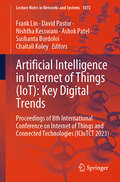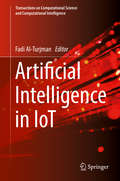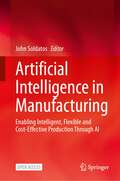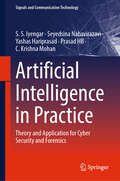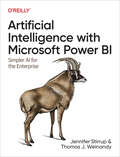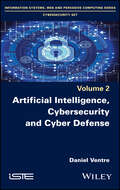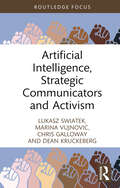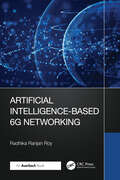- Table View
- List View
Artificial Intelligence and Sustainability (Signals and Communication Technology)
by Mohamed Ahmed AlloghaniThis book gives readers the tools to craft AI systems that don't just thrive today, but endure sustainably into the future. Whether a trailblazer or an aspiring innovator, this book enables readers to resonate with the ambitions of software developers, data scientists, and AI practitioners. The author covers the latest techniques and best practices for energy efficiency, reducing carbon footprints, and ensuring fair and ethical AI. The book also addresses important issues such as AI governance, managing risks, and ensuring transparency. Topics covered include understanding the relationship between AI and sustainable development, strategies for building efficient AI systems, and ethical considerations in AI development, among others. The author includes case studies of companies and organizations that have successfully implemented sustainable AI software development practices. Therefore, this book will be of interest to AI practitioners, academics, researchers, and lecturers in computer science, artificial intelligence, machine learning and data sciences.
Artificial Intelligence for Cloud and Edge Computing (Internet of Things)
by Vincenzo Piuri Sanjay Misra Lalit Garg Amit Kumar TyagiThis book discusses the future possibilities of AI with cloud computing and edge computing. The main goal of this book is to conduct analyses, implementation and discussion of many tools (of artificial intelligence, machine learning and deep learning and cloud computing, fog computing, and edge computing including concepts of cyber security) for understanding integration of these technologies. With this book, readers can quickly get an overview of these emerging topics and get many ideas of the future of AI with cloud, edge, and in many other areas. Topics include machine and deep learning techniques for Internet of Things based cloud systems; security, privacy and trust issues in AI based cloud and IoT based cloud systems; AI for smart data storage in cloud-based IoT; blockchain based solutions for AI based cloud and IoT based cloud systems.This book is relevent to researchers, academics, students, and professionals.
Artificial Intelligence for Data Science in Theory and Practice (Studies in Computational Intelligence #1006)
by Saad Subair Christopher Thron Mohamed AlloghaniThis book provides valuable information on effective, state-of-the-art techniques and approaches for governments, students, researchers, practitioners, entrepreneurs and teachers in the field of artificial intelligence (AI). The book explains the data and AI, types and properties of data, the relation between AI algorithms and data, what makes data AI ready, steps of data pre-processing, data quality, data storage and data platforms. Therefore, this book will be interested by AI practitioners, academics, researchers, and lecturers in computer science, artificial intelligence, machine learning and data sciences.
Artificial Intelligence for Digitising Industry – Applications
by Marcello Coppola Cristina De Luca Ovidiu Vermesan Reiner JohnThis book provides in-depth insights into use cases implementing artificial intelligence (AI) applications at the edge. It covers new ideas, concepts, research, and innovation to enable the development and deployment of AI, the industrial internet of things (IIoT), edge computing, and digital twin technologies in industrial environments. The work is based on the research results and activities of the AI4DI project, including an overview of industrial use cases, research, technological innovation, validation, and deployment. This book’s sections build on the research, development, and innovative ideas elaborated for applications in five industries: automotive, semiconductor, industrial machinery, food and beverage, and transportation. The articles included under each of these five industrial sectors discuss AI-based methods, techniques, models, algorithms, and supporting technologies, such as IIoT, edge computing, digital twins, collaborative robots, silicon-born AI circuit concepts, neuromorphic architectures, and augmented intelligence, that are anticipating the development of Industry 5.0. Automotive applications cover use cases addressing AI-based solutions for inbound logistics and assembly process optimisation, autonomous reconfigurable battery systems, virtual AI training platforms for robot learning, autonomous mobile robotic agents, and predictive maintenance for machines on the level of a digital twin. AI-based technologies and applications in the semiconductor manufacturing industry address use cases related to AI-based failure modes and effects analysis assistants, neural networks for predicting critical 3D dimensions in MEMS inertial sensors, machine vision systems developed in the wafer inspection production line, semiconductor wafer fault classifications, automatic inspection of scanning electron microscope cross-section images for technology verification, anomaly detection on wire bond process trace data, and optical inspection. The use cases presented for machinery and industrial equipment industry applications cover topics related to wood machinery, with the perception of the surrounding environment and intelligent robot applications. AI, IIoT, and robotics solutions are highlighted for the food and beverage industry, presenting use cases addressing novel AI-based environmental monitoring; autonomous environment-aware, quality control systems for Champagne production; and production process optimisation and predictive maintenance for soybeans manufacturing. For the transportation sector, the use cases presented cover the mobility-as-a-service development of AI-based fleet management for supporting multimodal transport. This book highlights the significant technological challenges that AI application developments in industrial sectors are facing, presenting several research challenges and open issues that should guide future development for evolution towards an environment-friendly Industry 5.0. The challenges presented for AI-based applications in industrial environments include issues related to complexity, multidisciplinary and heterogeneity, convergence of AI with other technologies, energy consumption and efficiency, knowledge acquisition, reasoning with limited data, fusion of heterogeneous data, availability of reliable data sets, verification, validation, and testing for decision-making processes.
Artificial Intelligence for Early Detection and Diagnosis of Cervical Cancer (Signals and Communication Technology)
by Rohit M. Thanki Sejal Shah Anjali DiwanThis book introduces the revolutionary use of AI in the field of cervical cancer detection. The book explores how advanced computer algorithms can analyze medical images and patient data to enhance early detection and accurate diagnosis of cervical cancer. The book starts by providing a comprehensive overview of cervical cancer, its risk factors, and the importance of early detection. It then delves into the fundamental concepts of artificial intelligence and its application in healthcare. Readers will gain a deeper understanding of how AI algorithms can "see" patterns in cervical cells and tissue, enabling the detection of abnormal cells and precancerous changes that may indicate the presence of cervical cancer. Drawing on the latest research and real-world case studies, the book showcases the various AI techniques used for cervical cancer screening, including the analysis of Pap smear and liquid-based cytology images. This book is an essential read for healthcare professionals, researchers, policymakers, and anyone interested in the intersection of AI and healthcare.
Artificial Intelligence for Internet of Things: Design Principle, Modernization, and Techniques (Smart Engineering Systems)
by Suman Lata Tripathi N Thillaiarasu V DhinakaranThe text comprehensively discusses the essentials of the Internet of Things (IoT), machine learning algorithms, industrial and medical IoT, robotics, data analytics tools, and technologies for smart cities. It further covers fundamental concepts, advanced tools, and techniques, along with the concept of energy-efficient systems. It also highlights software and hardware interfacing into the IoT platforms and systems for better understanding. It will serve as an ideal reference text for senior undergraduate, graduate students, and academic researchers in the fields of electrical engineering, electronics and communication engineering, and computer engineering. Features: Covers cognitive Internet of Things and emerging network, IoT in robotics, smart cities, and health care Discusses major issues in the field of the IoTsuch as scalable and secure issues, energy-efficient, and actuator devices Highlights the importance of industrial and medical IoT Illustrates applications of the IoT in robotics, smart grid, and smart cities Presents real-time examples for better understanding The text comprehensively discusses design principles, modernization techniques, advanced developments in artificial intelligence.This will be helpful for senior undergraduates, graduate students, and academic researchers in diverseengineering fields including electrical, electronics and communication, and computer science.
Artificial Intelligence for Smart Healthcare (EAI/Springer Innovations in Communication and Computing)
by Zdzislaw Polkowski Ahmed A. Elngar Ahmed J. Obaid Parul Agarwal Kavita KhannaThis book provides information on interdependencies of medicine and telecommunications engineering and how the two must rely on each other to effectively function in this era. The book discusses new techniques for medical service improvisation such as clear-cut views on medical technologies. The authors provide chapters on communication essentiality in healthcare, processing of medical amenities using medical images, the importance of data and information technology in medicine, and machine learning and artificial intelligence in healthcare. Authors include researchers, academics, and professionals in the field.
Artificial Intelligence for Sustainable Development (EAI/Springer Innovations in Communication and Computing)
by Anandakumar Haldorai Suriya Murugan Babitha Lincy R Minu BalakrishnanThis book delves into the synergy between AI and sustainability. This comprehensive guide illuminates the latest trends and cutting-edge techniques, offering invaluable insights for researchers, practitioners, and policymakers interested in the cross-section of AI and sustainability. The authors illustrate how AI-driven innovations are revolutionizing environmental conservation, urban planning, healthcare, and more. The book also considers the ethical considerations and governance frameworks crucial to harnessing AI's potential for global benefit. Whether a seasoned expert or a curious newcomer, this book empowers readers to navigate the dynamic landscape of AI and sustainability, paving the way for a more eco-conscious and equitable world.
Artificial Intelligence for Wireless Communication Systems: Technology and Applications (Modern Aspects of Computing, Devices, and Communication Engineering)
by Debdatta Kandar Samarendra Nath Sur Agbotiname Lucky Imoize Jyoti Sekhar Banerjee Ankan BhattacharyaThe text provides a comprehensive study of the application of advanced artificial intelligence (AI) in next-generation wireless communications with a focus on theory, standardization, and core development. It further highlights AI-enabled intelligent architecture for sixth-generation (6G) networks to realize smart resource management, automatic network adjustment, and intelligent service layers. The book covers artificially assisted non-orthogonal multiple access schemes for 6G communication.This book: Discusses the use of AI in various aspects of wireless communications, including channel modeling, signal detection, channel coding design, and resource management Explores technical challenges in the ubiquitous fifth-generation (5G) wireless networks and the prospects of introducing artificial intelligence-based techniques in the envisioned 6G wireless networks Presents potential issues in AI-enabled approaches in wireless communications Covers AI-enabled energy efficiency optimization and cross-layer optimization in the next-generation wireless networks Explains artificially empowered security and privacy schemes in next-generation wireless networks and next-generation mobile management It is primarily written for senior undergraduates, graduate students, and academic researchers in the fields of electrical engineering, electronics and communication engineering, and computer engineering.
Artificial Intelligence for a Sustainable Industry 4.0
by Dinesh Kumar Singh Carlos M. Travieso-González Goutam Sanyal Shashank AwasthiThis book outlines the recent advancements in the field of artificial intelligence (AI) and addresses how useful it is in achieving truly sustainable solutions. The book also serves as a useful reference literature in developing sustainable engineering solutions to various social and techno-commercial issues of global significance. This book is organized into two sections: section 1 is focused on fundamentals and principles of AI to lay the groundwork for the second section. Section 2 explores the sustainable engineering solutions development using AI, which addresses challenges in various computing techniques and opportunities in engineering design for sustainable development using IoT/AI and smart cities. Applications include waste minimization, re-manufacturing, reuse and recycling technologies using IoT/AI, Industry 4.0, intelligent and smart grid systems, energy conservation using technology, and robotic process automation (RPA). The book is ideal for the engineers, researchers and students interested in how AI can aid in sustainable development applications.
Artificial Intelligence in China: Proceedings of the 2nd International Conference on Artificial Intelligence in China (Lecture Notes in Electrical Engineering #653)
by Qilian Liang Wei Wang Jiasong Mu Xin Liu Zhenyu Na Xiantao CaiThis book brings together papers presented at The 2nd International Conference on Artificial Intelligence in China (ChinaAI) 2020, which provides a venue to disseminate the latest developments and to discuss the interactions and links between these multidisciplinary fields. Spanning topics covering all topics in artificial intelligence with new development in China, this book is aimed at undergraduate and graduate students in Electrical Engineering, Computer Science and Mathematics, researchers and engineers from academia and industry as well as government employees (such as NSF, DOD and DOE).
Artificial Intelligence in China: Proceedings of the 3rd International Conference on Artificial Intelligence in China (Lecture Notes in Electrical Engineering #854)
by Qilian Liang Wei Wang Jiasong Mu Xin Liu Zhenyu NaThis book brings together papers presented at the 3rd International Conference on Artificial Intelligence in China (ChinaAI), which provides a venue to disseminate the latest developments and to discuss the interactions and links between these multidisciplinary fields. Spanning topics covering all topics in Artificial Intelligence with new development in China, this book is aimed at undergraduate and graduate students in Electrical Engineering, Computer Science and Mathematics, researchers and engineers from academia and industry as well as government employees (such as NSF, DOD, DOE, etc).
Artificial Intelligence in China: Proceedings of the 4th International Conference on Artificial Intelligence in China (Lecture Notes in Electrical Engineering #871)
by Qilian Liang Wei Wang Jiasong Mu Xin Liu Zhenyu NaThis book brings together papers presented at the 4th International Conference on Artificial Intelligence in China (ChinaAI), Changbaishan, China, on July 23-24, 2022, which provides a venue to disseminate the latest developments and to discuss the interactions and links between these multidisciplinary fields. Spanning topics covering all topics in Artificial Intelligence with new development in China, this book is aimed at undergraduate and graduate students in Electrical Engineering, Computer Science and Mathematics, researchers and engineers from academia and industry as well as government employees (such as NSF, DOD, DOE, etc).
Artificial Intelligence in China: Proceedings of the International Conference on Artificial Intelligence in China (Lecture Notes in Electrical Engineering #572)
by Qilian Liang Wei Wang Jiasong Mu Xin Liu Zhenyu Na Bingcai ChenThis book brings together papers presented at the International Conference on Artificial Intelligence in China (ChinaAI) 2019, which provided a venue for disseminating the latest advances and discussing the interactions and links between the various subfields of AI. Addressing topics that cover virtually all aspects of AI and the latest developments in China, the book is chiefly intended for undergraduate and graduate students in Electrical Engineering, Computer Science, and Mathematics, for researchers and engineers from academia and industry, and for government employees (e.g. at the NSF, DOD, and DOE).
Artificial Intelligence in Cultural Production: Critical Perspectives on Digital Platforms (Routledge Studies in New Media and Cyberculture)
by Dal Yong JinThis book offers an in-depth academic discourse on the convergence of AI, digital platforms, and popular culture, in order to understand the ways in which the platform and cultural industries have reshaped and developed AI-driven algorithmic cultural production and consumption. At a time of fundamental change for the media and cultural industries, driven by the emergence of big data, algorithms, and AI, the book examines how media ecology and popular culture are evolving to serve the needs of both media and cultural industries and consumers. The analysis documents global governments’ rapid development of AI-relevant policies and identifies key policy issues; examines the ways in which cultural industries firms utilize AI and algorithms to advance the new forms of cultural production and distribution; investigates change in cultural consumption by analyzing the ways in which AI, algorithms, and digital platforms reshape people’s consumption habits; and examines whether governments and corporations have advanced reliable public and corporate policies and ethical codes to secure socio-economic equality. Offering a unique perspective on this timely and vital issue, this book will be of interest to scholars and students in media studies, communication studies, anthropology, globalization studies, sociology, cultural studies, Asian studies, and science and technology studies (STS).
Artificial Intelligence in Healthcare (Advanced Technologies and Societal Change)
by Tarun K. Sharma Chitresh Banerjee Lalit Garg Sebastian BasterrechThis book highlights the analytics and optimization issues in healthcare systems, proposes new approaches, and presents applications of innovative approaches in real facilities. In the past few decades, there has been an exponential rise in the application of swarm intelligence techniques for solving complex and intricate problems arising in healthcare. The versatility of these techniques has made them a favorite among scientists and researchers working in diverse areas. The primary objective of this book is to bring forward thorough, in-depth, and well-focused developments of hybrid variants of swarm intelligence algorithms and their applications in healthcare systems.
Artificial Intelligence in Industry 4.0 and 5G Technology
by Pandian Vasant Gerhard-Wilhelm Weber Elias Munapo J. Joshua ThomasArtificial Intelligence in Industry 4.0 and 5G Technology Explores innovative and value-added solutions for application problems in the commercial, business, and industry sectors As the pace of Artificial Intelligence (AI) technology innovation continues to accelerate, identifying the appropriate AI capabilities to embed in key decision processes has never been more critical to establishing competitive advantage. New and emerging analytics tools and technologies can be configured to optimize business value, change how an organization gains insights, and significantly improve the decision-making process across the enterprise. Artificial Intelligence in Industry 4.0 and 5G Technology helps readers solve real-world technological engineering optimization problems using evolutionary and swarm intelligence, mathematical programming, multi-objective optimization, and other cutting-edge intelligent optimization methods. Contributions from leading experts in the field present original research on both the theoretical and practical aspects of implementing new AI techniques in a variety of sectors, including Big Data analytics, smart manufacturing, renewable energy, smart cities, robotics, and the Internet of Things (IoT). Presents detailed information on meta-heuristic applications with a focus on technology and engineering sectors such as smart manufacturing, smart production, innovative cities, and 5G networks. Offers insights into the use of metaheuristic strategies to solve optimization problems in business, economics, finance, and industry where uncertainty is a factor. Provides guidance on implementing metaheuristics in different applications and hybrid technological systems. Describes various AI approaches utilizing hybrid meta-heuristics optimization algorithms, including meta-search engines for innovative research and hyper-heuristics algorithms for performance measurement. Artificial Intelligence in Industry 4.0 and 5G Technology is a valuable resource for IT specialists, industry professionals, managers and executives, researchers, scientists, engineers, and advanced students an up-to-date reference to innovative computing, uncertainty management, and optimization approaches.
Artificial Intelligence in Internet of Things: Proceedings of 8th International Conference on Internet of Things and Connected Technologies (ICIoTCT 2023) (Lecture Notes in Networks and Systems #1072)
by Ashok Patel Nishtha Kesswani Sushanta Bordoloi Frank Lin David Pastor Chaitali KoleyThis book is a collection of high-quality research papers presented at 8th International Conference on Internet of Things and Connected Technologies (ICIoTCT 2023), held at National Institute of Technology (NIT), Mizoram, India, during 29–30 September 2023. This book presents recent advances on IoT and connected technologies. This book is designed for marketing managers, business professionals, researchers, academicians, and graduate-level students seeking to learn how IoT and connecting technologies increase the amount of data gained through devices, enhance customer experience, and widen the scope of IoT analytics in enhancing customer marketing outcomes.
Artificial Intelligence in IoT (Transactions on Computational Science and Computational Intelligence)
by Fadi Al-TurjmanThis book provides an insight into IoT intelligence in terms of applications and algorithmic challenges. The book is dedicated to addressing the major challenges in realizing the artificial intelligence in IoT-based applications including challenges that vary from cost and energy efficiency to availability to service quality in multidisciplinary fashion. The aim of this book is hence to focus on both the algorithmic and practical parts of the artificial intelligence approaches in IoT applications that are enabled and supported by wireless sensor networks and cellular networks. Targeted readers are from varying disciplines who are interested in implementing the smart planet/environments vision via intelligent wireless/wired enabling technologies.Includes the most up-to-date research and applications related to IoT artificial intelligence (AI);Provides new and innovative operational ideas regarding the IoT artificial intelligence that help advance the telecommunications industry;Presents AI challenges facing the IoT scientists and provides potential ways to solve them in critical daily life issues.
Artificial Intelligence in Manufacturing: Enabling Intelligent, Flexible and Cost-Effective Production Through AI
by John SoldatosThis open access book presents a rich set of innovative solutions for artificial intelligence (AI) in manufacturing. The various chapters of the book provide a broad coverage of AI systems for state of the art flexible production lines including both cyber-physical production systems (Industry 4.0) and emerging trustworthy and human-centered manufacturing systems (Industry 5.0). From a technology perspective, the book addresses a wide range of AI paradigms such as deep learning, reinforcement learning, active learning, agent-based systems, explainable AI, industrial robots, and AI-based digital twins. Emphasis is put on system architectures and technologies that foster human-AI collaboration based on trusted interactions between workers and AI systems. From a manufacturing applications perspective, the book illustrates the deployment of these AI paradigms in a variety of use cases spanning production planning, quality control, anomaly detection, metrology, workers’ training, supply chain management, as well as various production optimization scenarios. This is an open access book.
Artificial Intelligence in Practice: Theory and Application for Cyber Security and Forensics (Signals and Communication Technology)
by S.S. Iyengar Seyedsina Nabavirazavi Yashas Hariprasad Prasad HB C. Krishna MohanThis book provides a comprehensive exploration of how Artificial Intelligence (AI) is being applied in the fields of cyber security and digital forensics. The book delves into the cutting-edge techniques that are reshaping the way we protect and investigate digital information. From identifying cyber threats in real-time to uncovering hidden evidence in complex digital cases, this book offers practical insights and real-world examples. Whether you&’re a professional in the field or simply interested in understanding how AI is revolutionizing digital security, this book will guide you through the latest advancements and their implications for the future. Includes application of AI in solving real cyber security and digital forensics challenges, offering tangible examples; Shows how AI methods from machine / deep learning to NLP can be used for cyber defenses and in forensic investigations; Explores emerging trends and future possibilities, helping readers stay ahead of the curve in a rapidly evolving field.
Artificial Intelligence with Microsoft Power BI: Simpler AI for the Enterprise
by Jen Stirrup Thomas J. WeinandyAdvance your Power BI skills by adding AI to your repertoire at a practice level. With this practical book, business-oriented software engineers and developers will learn the terminologies, practices, and strategy necessary to successfully incorporate AI into your business intelligence estate. Jen Stirrup, CEO of AI and BI leadership consultancy Data Relish, and Thomas Weinandy, research economist at Upside, show you how to use data already available to your organization.Springboarding from the skills that you already possess, this book adds AI to your organization's technical capability and expertise with Microsoft Power BI. By using your conceptual knowledge of BI, you'll learn how to choose the right model for your AI work and identify its value and validity.Use Power BI to build a good data model for AIDemystify the AI terminology that you need to knowIdentify AI project roles, responsibilities, and teams for AIUse AI models, including supervised machine learning techniquesDevelop and train models in Azure ML for consumption in Power BIImprove your business AI maturity level with Power BIUse the AI feedback loop to help you get started with the next project
Artificial Intelligence, Cybersecurity and Cyber Defence
by Daniel VentreThe aim of the book is to analyse and understand the impacts of artificial intelligence in the fields of national security and defense; to identify the political, geopolitical, strategic issues of AI; to analyse its place in conflicts and cyberconflicts, and more generally in the various forms of violence; to explain the appropriation of artificial intelligence by military organizations, but also law enforcement agencies and the police; to discuss the questions that the development of artificial intelligence and its use raise in armies, police, intelligence agencies, at the tactical, operational and strategic levels.
Artificial Intelligence, Strategic Communicators and Activism (Global PR Insights)
by Marina Vujnovic Dean Kruckeberg Lukasz Swiatek Chris GallowayIn a world that is increasingly wary of artificial intelligence (AI), this book explores the pressing need for strategic communicators to move away from being advocates for AI and move towards a more critical activist role that enables them to counter AI-driven threats to communities and relationships. AI is contributing to inequality, misinformation and environmental damage, among other problems. This book argues that strategic communicators are uniquely placed to help counter AI-driven challenges because of their skills in relationship-building and their ability to craft and deliver messages effectively. By discussing the different professional activist approaches that communicators can take in relation to growing AI challenges, the book offers multiple perspectives that will help to build knowledge in diverse settings and develop practice, especially in community and activist strategic communication. Research-based and combining theory with practice, this thought-provoking book will be welcomed by strategic communication scholars and practitioners alike eager to develop a critical approach to the challenges surrounding AI.
Artificial Intelligence-Based 6G Networking
by Radhika Ranjan RoyArtificial Intelligence-Based 6G Networking focuses exclusively on the upcoming sixth-generation (6G) network and services slated for implementation by 2030. It explores the paradigm shift that is 6G. It discusses the deep integration of computing and communication, supported by artificial intelligence (AI) across network elements like cloud, edge, and terminals. It also examines how AI-native interfaces will permeate various network components, from radio access networks to application servers and databases.Proposing a unified AI-enabled framework for optimizing networks and applications as a single integrated system, the book covers how network service providers can tailor network baselines, reduce noise, and accurately identify issues. The book delves into the potential of AI-driven networks to self-correct, predict, and rectify service degradations proactively, enhancing uptime and troubleshooting efficiency. It outlines the “Connection, Communication, Collaboration, Curation, and Community” framework to enhance network effects, aiding operators in automation, cost reduction, and providing optimal user experiences.Covering topics from MIMO and Massive MIMO to holographic communications, cybersecurity and quantum communications, the book explores cutting-edge technologies shaping the future of 6G networks. It anticipates a future where AI, along with machine learning and deep learning, enables continuous learning, self-optimization, and predictive maintenance, even with full automation, that will be the hallmark of a new era in network connectivity and innovation.
